Damilola Shasanya: Honours Project on Positive Reinforcement
VerifiedAdded on 2022/08/15
|13
|3282
|13
Project
AI Summary
This document presents Damilola Shasanya's Honours Project proposal for the University of Bedfordshire, focusing on the ethics of positive reinforcement in education. The project aims to assess the advantages and disadvantages of using positive reinforcement as a teaching method, with a specific focus on student behavior changes through quantitative research. The proposal outlines the theoretical framework, research objectives, methodology (including participant selection, materials, and data analysis), and ethical considerations. The study will employ a quantitative design, comparing experimental and control groups to evaluate the impact of positive reinforcement. The proposal also includes a detailed research timetable and essential forms such as information, consent, and debriefing templates. The research will involve university students and follow ethical guidelines, including voluntary participation and anonymity. The project will assess the benefits and drawbacks of this approach and determine whether its inclusion in learning is justified.
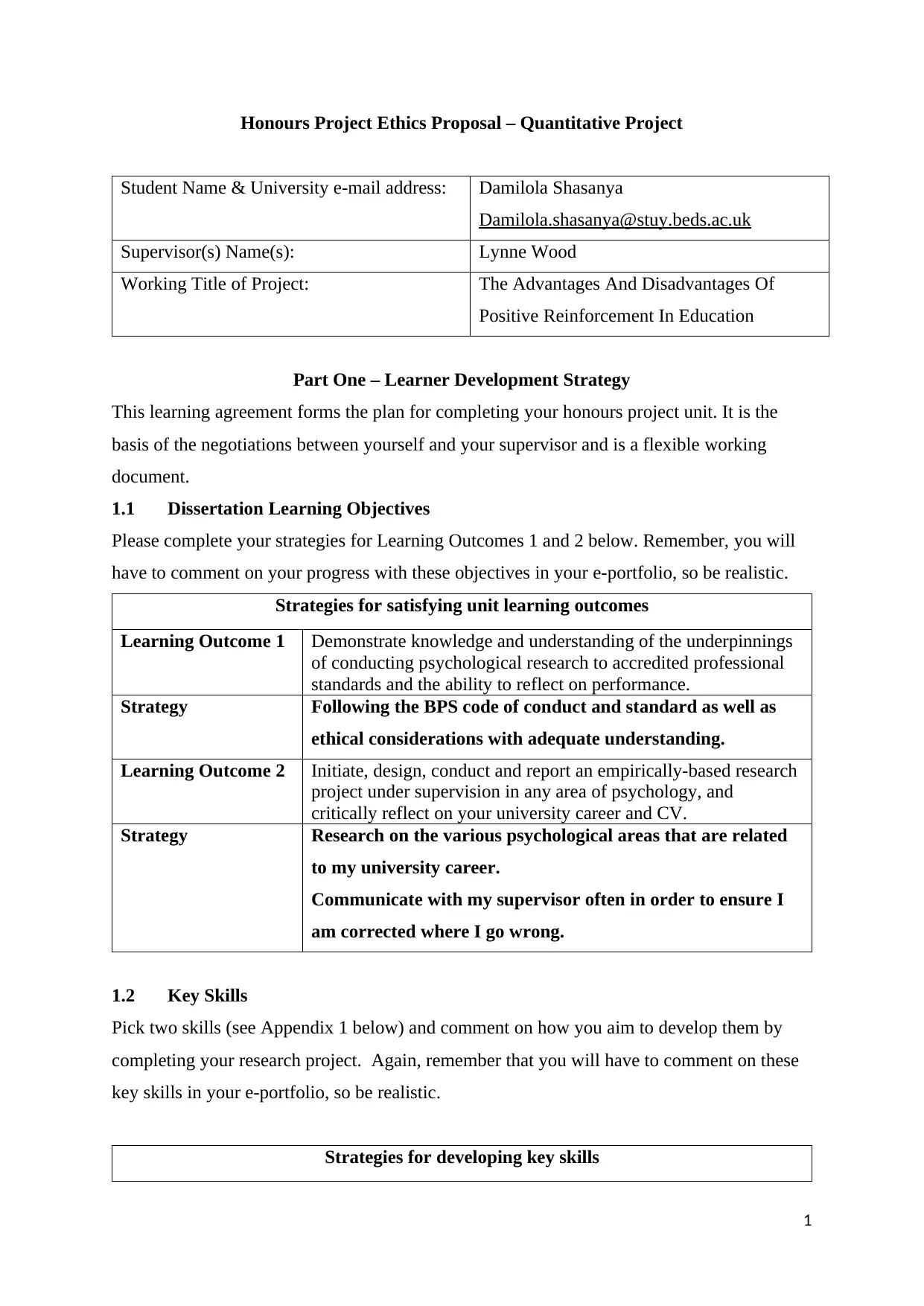
Honours Project Ethics Proposal – Quantitative Project
Student Name & University e-mail address: Damilola Shasanya
Damilola.shasanya@stuy.beds.ac.uk
Supervisor(s) Name(s): Lynne Wood
Working Title of Project: The Advantages And Disadvantages Of
Positive Reinforcement In Education
Part One – Learner Development Strategy
This learning agreement forms the plan for completing your honours project unit. It is the
basis of the negotiations between yourself and your supervisor and is a flexible working
document.
1.1 Dissertation Learning Objectives
Please complete your strategies for Learning Outcomes 1 and 2 below. Remember, you will
have to comment on your progress with these objectives in your e-portfolio, so be realistic.
Strategies for satisfying unit learning outcomes
Learning Outcome 1 Demonstrate knowledge and understanding of the underpinnings
of conducting psychological research to accredited professional
standards and the ability to reflect on performance.
Strategy Following the BPS code of conduct and standard as well as
ethical considerations with adequate understanding.
Learning Outcome 2 Initiate, design, conduct and report an empirically-based research
project under supervision in any area of psychology, and
critically reflect on your university career and CV.
Strategy Research on the various psychological areas that are related
to my university career.
Communicate with my supervisor often in order to ensure I
am corrected where I go wrong.
1.2 Key Skills
Pick two skills (see Appendix 1 below) and comment on how you aim to develop them by
completing your research project. Again, remember that you will have to comment on these
key skills in your e-portfolio, so be realistic.
Strategies for developing key skills
1
Student Name & University e-mail address: Damilola Shasanya
Damilola.shasanya@stuy.beds.ac.uk
Supervisor(s) Name(s): Lynne Wood
Working Title of Project: The Advantages And Disadvantages Of
Positive Reinforcement In Education
Part One – Learner Development Strategy
This learning agreement forms the plan for completing your honours project unit. It is the
basis of the negotiations between yourself and your supervisor and is a flexible working
document.
1.1 Dissertation Learning Objectives
Please complete your strategies for Learning Outcomes 1 and 2 below. Remember, you will
have to comment on your progress with these objectives in your e-portfolio, so be realistic.
Strategies for satisfying unit learning outcomes
Learning Outcome 1 Demonstrate knowledge and understanding of the underpinnings
of conducting psychological research to accredited professional
standards and the ability to reflect on performance.
Strategy Following the BPS code of conduct and standard as well as
ethical considerations with adequate understanding.
Learning Outcome 2 Initiate, design, conduct and report an empirically-based research
project under supervision in any area of psychology, and
critically reflect on your university career and CV.
Strategy Research on the various psychological areas that are related
to my university career.
Communicate with my supervisor often in order to ensure I
am corrected where I go wrong.
1.2 Key Skills
Pick two skills (see Appendix 1 below) and comment on how you aim to develop them by
completing your research project. Again, remember that you will have to comment on these
key skills in your e-portfolio, so be realistic.
Strategies for developing key skills
1
Paraphrase This Document
Need a fresh take? Get an instant paraphrase of this document with our AI Paraphraser
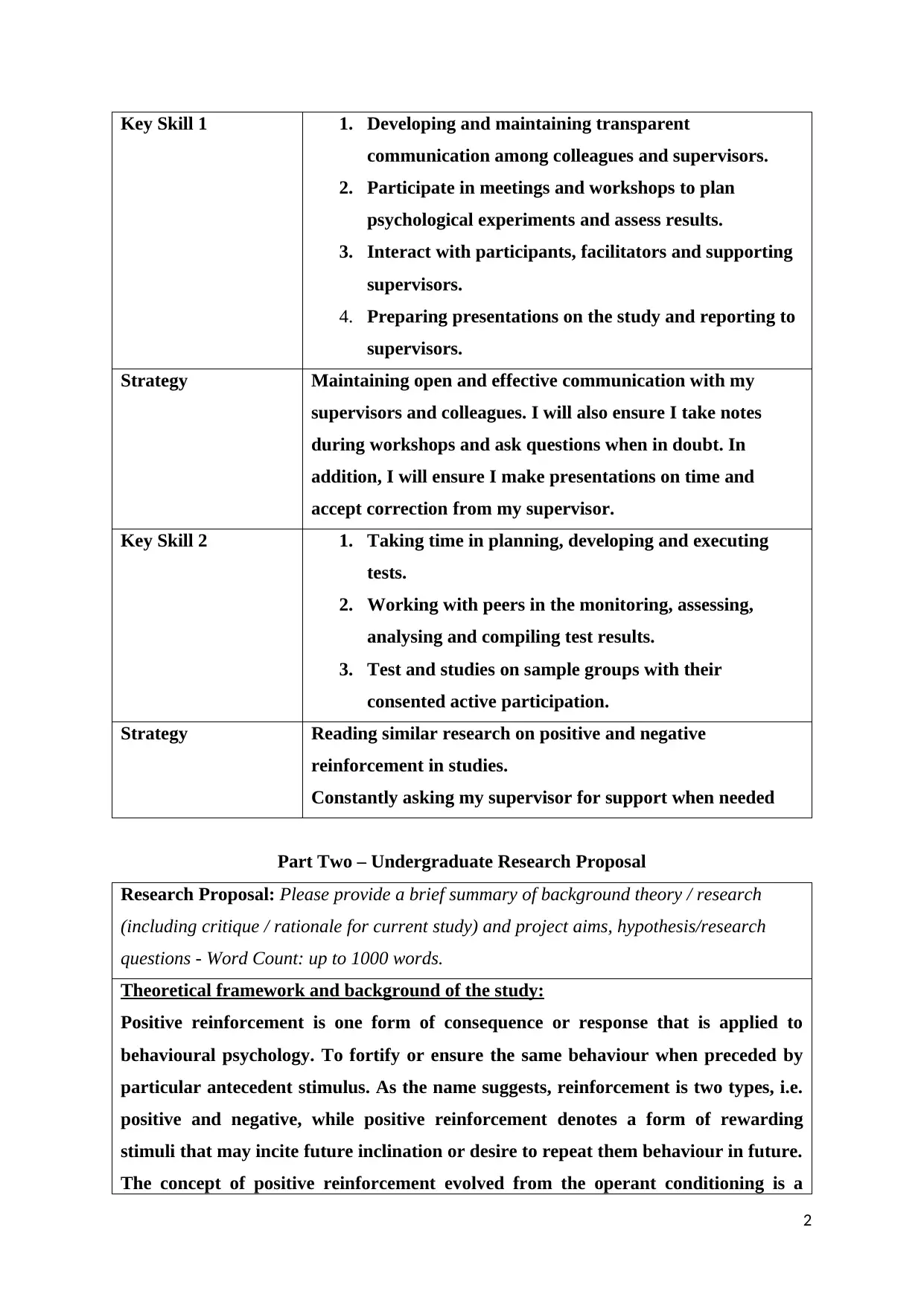
Key Skill 1 1. Developing and maintaining transparent
communication among colleagues and supervisors.
2. Participate in meetings and workshops to plan
psychological experiments and assess results.
3. Interact with participants, facilitators and supporting
supervisors.
4. Preparing presentations on the study and reporting to
supervisors.
Strategy Maintaining open and effective communication with my
supervisors and colleagues. I will also ensure I take notes
during workshops and ask questions when in doubt. In
addition, I will ensure I make presentations on time and
accept correction from my supervisor.
Key Skill 2 1. Taking time in planning, developing and executing
tests.
2. Working with peers in the monitoring, assessing,
analysing and compiling test results.
3. Test and studies on sample groups with their
consented active participation.
Strategy Reading similar research on positive and negative
reinforcement in studies.
Constantly asking my supervisor for support when needed
Part Two – Undergraduate Research Proposal
Research Proposal: Please provide a brief summary of background theory / research
(including critique / rationale for current study) and project aims, hypothesis/research
questions - Word Count: up to 1000 words.
Theoretical framework and background of the study:
Positive reinforcement is one form of consequence or response that is applied to
behavioural psychology. To fortify or ensure the same behaviour when preceded by
particular antecedent stimulus. As the name suggests, reinforcement is two types, i.e.
positive and negative, while positive reinforcement denotes a form of rewarding
stimuli that may incite future inclination or desire to repeat them behaviour in future.
The concept of positive reinforcement evolved from the operant conditioning is a
2
communication among colleagues and supervisors.
2. Participate in meetings and workshops to plan
psychological experiments and assess results.
3. Interact with participants, facilitators and supporting
supervisors.
4. Preparing presentations on the study and reporting to
supervisors.
Strategy Maintaining open and effective communication with my
supervisors and colleagues. I will also ensure I take notes
during workshops and ask questions when in doubt. In
addition, I will ensure I make presentations on time and
accept correction from my supervisor.
Key Skill 2 1. Taking time in planning, developing and executing
tests.
2. Working with peers in the monitoring, assessing,
analysing and compiling test results.
3. Test and studies on sample groups with their
consented active participation.
Strategy Reading similar research on positive and negative
reinforcement in studies.
Constantly asking my supervisor for support when needed
Part Two – Undergraduate Research Proposal
Research Proposal: Please provide a brief summary of background theory / research
(including critique / rationale for current study) and project aims, hypothesis/research
questions - Word Count: up to 1000 words.
Theoretical framework and background of the study:
Positive reinforcement is one form of consequence or response that is applied to
behavioural psychology. To fortify or ensure the same behaviour when preceded by
particular antecedent stimulus. As the name suggests, reinforcement is two types, i.e.
positive and negative, while positive reinforcement denotes a form of rewarding
stimuli that may incite future inclination or desire to repeat them behaviour in future.
The concept of positive reinforcement evolved from the operant conditioning is a
2
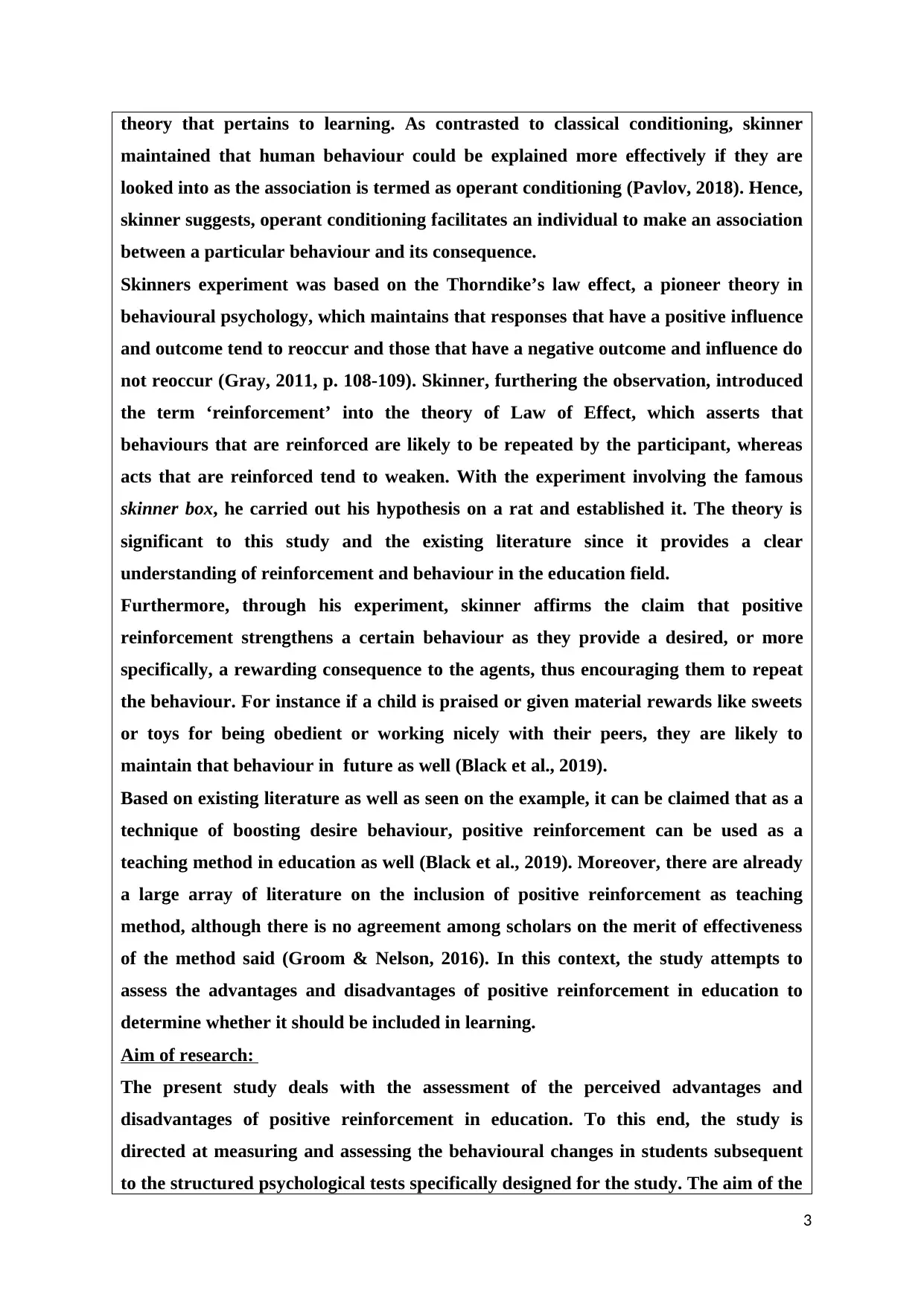
theory that pertains to learning. As contrasted to classical conditioning, skinner
maintained that human behaviour could be explained more effectively if they are
looked into as the association is termed as operant conditioning (Pavlov, 2018). Hence,
skinner suggests, operant conditioning facilitates an individual to make an association
between a particular behaviour and its consequence.
Skinners experiment was based on the Thorndike’s law effect, a pioneer theory in
behavioural psychology, which maintains that responses that have a positive influence
and outcome tend to reoccur and those that have a negative outcome and influence do
not reoccur (Gray, 2011, p. 108-109). Skinner, furthering the observation, introduced
the term ‘reinforcement’ into the theory of Law of Effect, which asserts that
behaviours that are reinforced are likely to be repeated by the participant, whereas
acts that are reinforced tend to weaken. With the experiment involving the famous
skinner box, he carried out his hypothesis on a rat and established it. The theory is
significant to this study and the existing literature since it provides a clear
understanding of reinforcement and behaviour in the education field.
Furthermore, through his experiment, skinner affirms the claim that positive
reinforcement strengthens a certain behaviour as they provide a desired, or more
specifically, a rewarding consequence to the agents, thus encouraging them to repeat
the behaviour. For instance if a child is praised or given material rewards like sweets
or toys for being obedient or working nicely with their peers, they are likely to
maintain that behaviour in future as well (Black et al., 2019).
Based on existing literature as well as seen on the example, it can be claimed that as a
technique of boosting desire behaviour, positive reinforcement can be used as a
teaching method in education as well (Black et al., 2019). Moreover, there are already
a large array of literature on the inclusion of positive reinforcement as teaching
method, although there is no agreement among scholars on the merit of effectiveness
of the method said (Groom & Nelson, 2016). In this context, the study attempts to
assess the advantages and disadvantages of positive reinforcement in education to
determine whether it should be included in learning.
Aim of research:
The present study deals with the assessment of the perceived advantages and
disadvantages of positive reinforcement in education. To this end, the study is
directed at measuring and assessing the behavioural changes in students subsequent
to the structured psychological tests specifically designed for the study. The aim of the
3
maintained that human behaviour could be explained more effectively if they are
looked into as the association is termed as operant conditioning (Pavlov, 2018). Hence,
skinner suggests, operant conditioning facilitates an individual to make an association
between a particular behaviour and its consequence.
Skinners experiment was based on the Thorndike’s law effect, a pioneer theory in
behavioural psychology, which maintains that responses that have a positive influence
and outcome tend to reoccur and those that have a negative outcome and influence do
not reoccur (Gray, 2011, p. 108-109). Skinner, furthering the observation, introduced
the term ‘reinforcement’ into the theory of Law of Effect, which asserts that
behaviours that are reinforced are likely to be repeated by the participant, whereas
acts that are reinforced tend to weaken. With the experiment involving the famous
skinner box, he carried out his hypothesis on a rat and established it. The theory is
significant to this study and the existing literature since it provides a clear
understanding of reinforcement and behaviour in the education field.
Furthermore, through his experiment, skinner affirms the claim that positive
reinforcement strengthens a certain behaviour as they provide a desired, or more
specifically, a rewarding consequence to the agents, thus encouraging them to repeat
the behaviour. For instance if a child is praised or given material rewards like sweets
or toys for being obedient or working nicely with their peers, they are likely to
maintain that behaviour in future as well (Black et al., 2019).
Based on existing literature as well as seen on the example, it can be claimed that as a
technique of boosting desire behaviour, positive reinforcement can be used as a
teaching method in education as well (Black et al., 2019). Moreover, there are already
a large array of literature on the inclusion of positive reinforcement as teaching
method, although there is no agreement among scholars on the merit of effectiveness
of the method said (Groom & Nelson, 2016). In this context, the study attempts to
assess the advantages and disadvantages of positive reinforcement in education to
determine whether it should be included in learning.
Aim of research:
The present study deals with the assessment of the perceived advantages and
disadvantages of positive reinforcement in education. To this end, the study is
directed at measuring and assessing the behavioural changes in students subsequent
to the structured psychological tests specifically designed for the study. The aim of the
3
⊘ This is a preview!⊘
Do you want full access?
Subscribe today to unlock all pages.

Trusted by 1+ million students worldwide
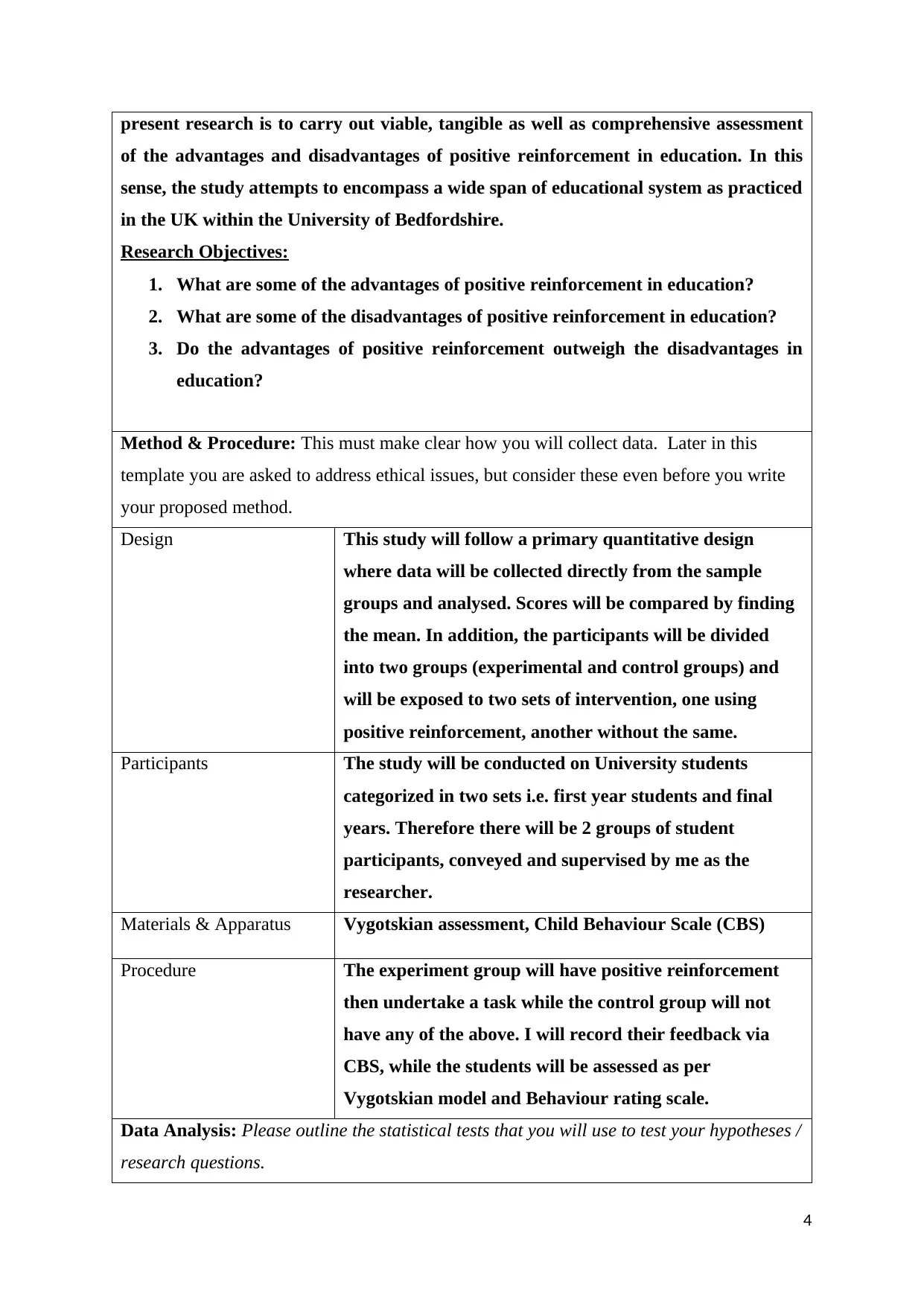
present research is to carry out viable, tangible as well as comprehensive assessment
of the advantages and disadvantages of positive reinforcement in education. In this
sense, the study attempts to encompass a wide span of educational system as practiced
in the UK within the University of Bedfordshire.
Research Objectives:
1. What are some of the advantages of positive reinforcement in education?
2. What are some of the disadvantages of positive reinforcement in education?
3. Do the advantages of positive reinforcement outweigh the disadvantages in
education?
Method & Procedure: This must make clear how you will collect data. Later in this
template you are asked to address ethical issues, but consider these even before you write
your proposed method.
Design This study will follow a primary quantitative design
where data will be collected directly from the sample
groups and analysed. Scores will be compared by finding
the mean. In addition, the participants will be divided
into two groups (experimental and control groups) and
will be exposed to two sets of intervention, one using
positive reinforcement, another without the same.
Participants The study will be conducted on University students
categorized in two sets i.e. first year students and final
years. Therefore there will be 2 groups of student
participants, conveyed and supervised by me as the
researcher.
Materials & Apparatus Vygotskian assessment, Child Behaviour Scale (CBS)
Procedure The experiment group will have positive reinforcement
then undertake a task while the control group will not
have any of the above. I will record their feedback via
CBS, while the students will be assessed as per
Vygotskian model and Behaviour rating scale.
Data Analysis: Please outline the statistical tests that you will use to test your hypotheses /
research questions.
4
of the advantages and disadvantages of positive reinforcement in education. In this
sense, the study attempts to encompass a wide span of educational system as practiced
in the UK within the University of Bedfordshire.
Research Objectives:
1. What are some of the advantages of positive reinforcement in education?
2. What are some of the disadvantages of positive reinforcement in education?
3. Do the advantages of positive reinforcement outweigh the disadvantages in
education?
Method & Procedure: This must make clear how you will collect data. Later in this
template you are asked to address ethical issues, but consider these even before you write
your proposed method.
Design This study will follow a primary quantitative design
where data will be collected directly from the sample
groups and analysed. Scores will be compared by finding
the mean. In addition, the participants will be divided
into two groups (experimental and control groups) and
will be exposed to two sets of intervention, one using
positive reinforcement, another without the same.
Participants The study will be conducted on University students
categorized in two sets i.e. first year students and final
years. Therefore there will be 2 groups of student
participants, conveyed and supervised by me as the
researcher.
Materials & Apparatus Vygotskian assessment, Child Behaviour Scale (CBS)
Procedure The experiment group will have positive reinforcement
then undertake a task while the control group will not
have any of the above. I will record their feedback via
CBS, while the students will be assessed as per
Vygotskian model and Behaviour rating scale.
Data Analysis: Please outline the statistical tests that you will use to test your hypotheses /
research questions.
4
Paraphrase This Document
Need a fresh take? Get an instant paraphrase of this document with our AI Paraphraser
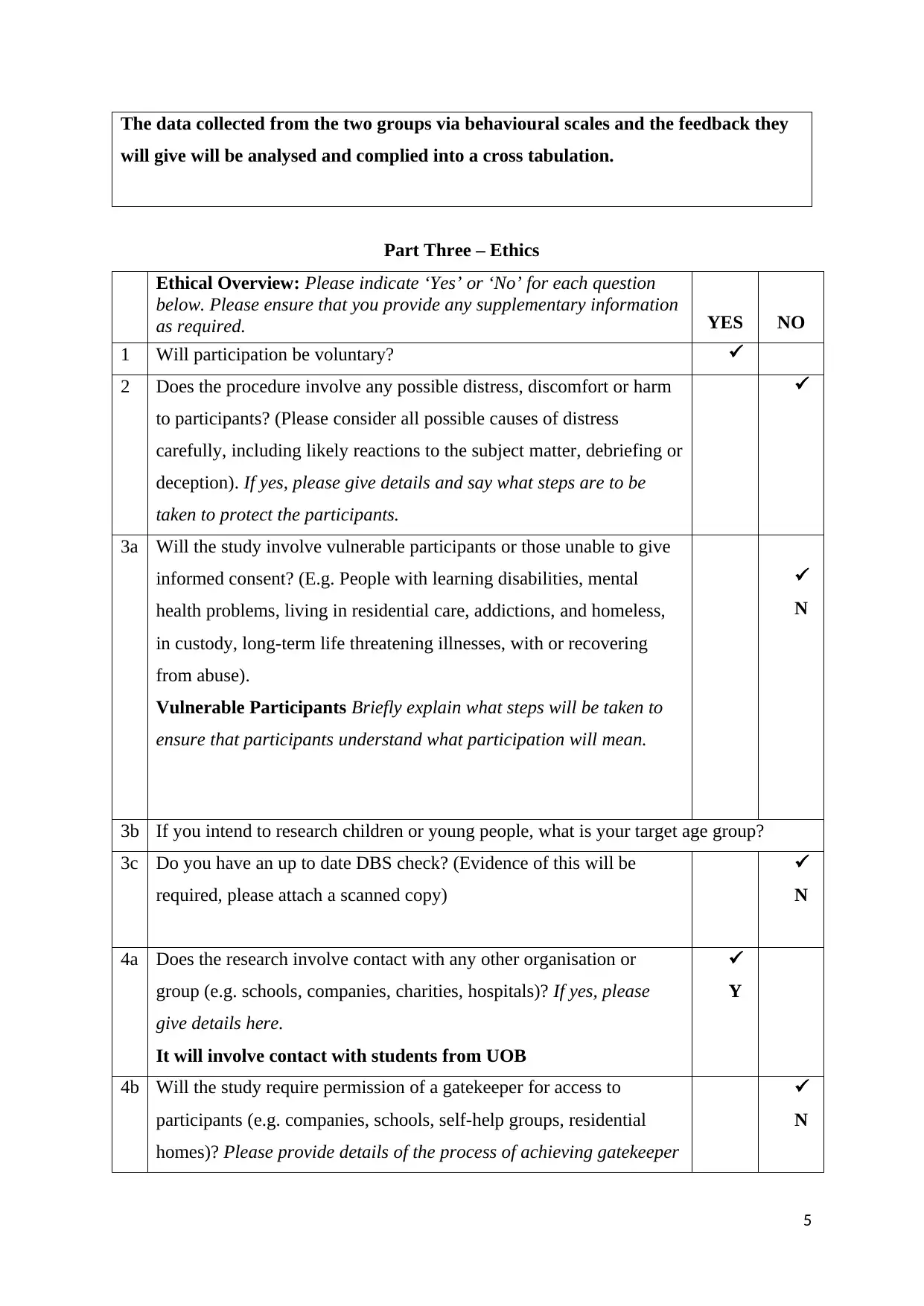
The data collected from the two groups via behavioural scales and the feedback they
will give will be analysed and complied into a cross tabulation.
Part Three – Ethics
Ethical Overview: Please indicate ‘Yes’ or ‘No’ for each question
below. Please ensure that you provide any supplementary information
as required. YES NO
1 Will participation be voluntary?
2 Does the procedure involve any possible distress, discomfort or harm
to participants? (Please consider all possible causes of distress
carefully, including likely reactions to the subject matter, debriefing or
deception). If yes, please give details and say what steps are to be
taken to protect the participants.
3a Will the study involve vulnerable participants or those unable to give
informed consent? (E.g. People with learning disabilities, mental
health problems, living in residential care, addictions, and homeless,
in custody, long-term life threatening illnesses, with or recovering
from abuse).
Vulnerable Participants Briefly explain what steps will be taken to
ensure that participants understand what participation will mean.
N
3b If you intend to research children or young people, what is your target age group?
3c Do you have an up to date DBS check? (Evidence of this will be
required, please attach a scanned copy)
N
4a Does the research involve contact with any other organisation or
group (e.g. schools, companies, charities, hospitals)? If yes, please
give details here.
It will involve contact with students from UOB
Y
4b Will the study require permission of a gatekeeper for access to
participants (e.g. companies, schools, self-help groups, residential
homes)? Please provide details of the process of achieving gatekeeper
N
5
will give will be analysed and complied into a cross tabulation.
Part Three – Ethics
Ethical Overview: Please indicate ‘Yes’ or ‘No’ for each question
below. Please ensure that you provide any supplementary information
as required. YES NO
1 Will participation be voluntary?
2 Does the procedure involve any possible distress, discomfort or harm
to participants? (Please consider all possible causes of distress
carefully, including likely reactions to the subject matter, debriefing or
deception). If yes, please give details and say what steps are to be
taken to protect the participants.
3a Will the study involve vulnerable participants or those unable to give
informed consent? (E.g. People with learning disabilities, mental
health problems, living in residential care, addictions, and homeless,
in custody, long-term life threatening illnesses, with or recovering
from abuse).
Vulnerable Participants Briefly explain what steps will be taken to
ensure that participants understand what participation will mean.
N
3b If you intend to research children or young people, what is your target age group?
3c Do you have an up to date DBS check? (Evidence of this will be
required, please attach a scanned copy)
N
4a Does the research involve contact with any other organisation or
group (e.g. schools, companies, charities, hospitals)? If yes, please
give details here.
It will involve contact with students from UOB
Y
4b Will the study require permission of a gatekeeper for access to
participants (e.g. companies, schools, self-help groups, residential
homes)? Please provide details of the process of achieving gatekeeper
N
5
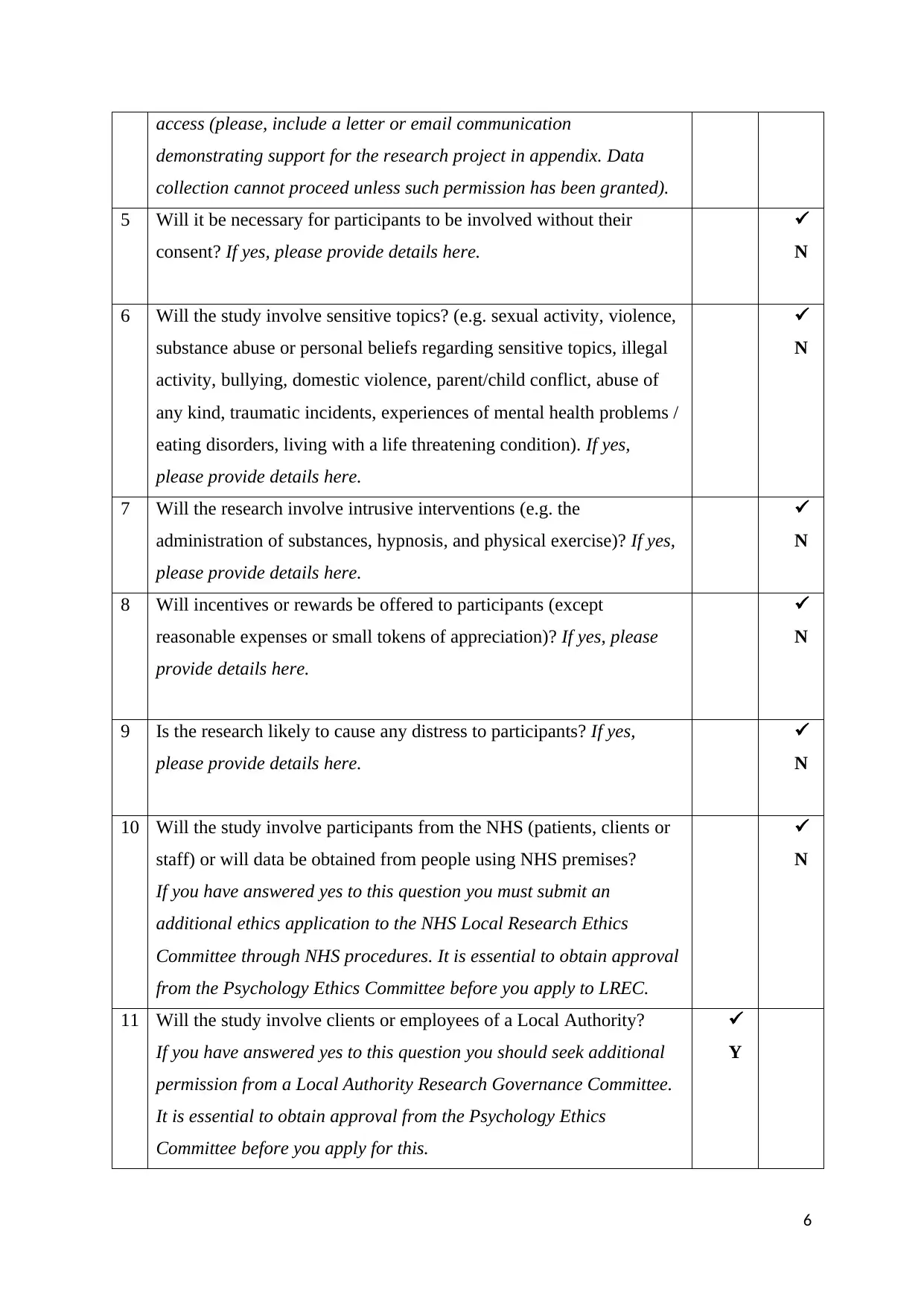
access (please, include a letter or email communication
demonstrating support for the research project in appendix. Data
collection cannot proceed unless such permission has been granted).
5 Will it be necessary for participants to be involved without their
consent? If yes, please provide details here.
N
6 Will the study involve sensitive topics? (e.g. sexual activity, violence,
substance abuse or personal beliefs regarding sensitive topics, illegal
activity, bullying, domestic violence, parent/child conflict, abuse of
any kind, traumatic incidents, experiences of mental health problems /
eating disorders, living with a life threatening condition). If yes,
please provide details here.
N
7 Will the research involve intrusive interventions (e.g. the
administration of substances, hypnosis, and physical exercise)? If yes,
please provide details here.
N
8 Will incentives or rewards be offered to participants (except
reasonable expenses or small tokens of appreciation)? If yes, please
provide details here.
N
9 Is the research likely to cause any distress to participants? If yes,
please provide details here.
N
10 Will the study involve participants from the NHS (patients, clients or
staff) or will data be obtained from people using NHS premises?
If you have answered yes to this question you must submit an
additional ethics application to the NHS Local Research Ethics
Committee through NHS procedures. It is essential to obtain approval
from the Psychology Ethics Committee before you apply to LREC.
N
11 Will the study involve clients or employees of a Local Authority?
If you have answered yes to this question you should seek additional
permission from a Local Authority Research Governance Committee.
It is essential to obtain approval from the Psychology Ethics
Committee before you apply for this.
Y
6
demonstrating support for the research project in appendix. Data
collection cannot proceed unless such permission has been granted).
5 Will it be necessary for participants to be involved without their
consent? If yes, please provide details here.
N
6 Will the study involve sensitive topics? (e.g. sexual activity, violence,
substance abuse or personal beliefs regarding sensitive topics, illegal
activity, bullying, domestic violence, parent/child conflict, abuse of
any kind, traumatic incidents, experiences of mental health problems /
eating disorders, living with a life threatening condition). If yes,
please provide details here.
N
7 Will the research involve intrusive interventions (e.g. the
administration of substances, hypnosis, and physical exercise)? If yes,
please provide details here.
N
8 Will incentives or rewards be offered to participants (except
reasonable expenses or small tokens of appreciation)? If yes, please
provide details here.
N
9 Is the research likely to cause any distress to participants? If yes,
please provide details here.
N
10 Will the study involve participants from the NHS (patients, clients or
staff) or will data be obtained from people using NHS premises?
If you have answered yes to this question you must submit an
additional ethics application to the NHS Local Research Ethics
Committee through NHS procedures. It is essential to obtain approval
from the Psychology Ethics Committee before you apply to LREC.
N
11 Will the study involve clients or employees of a Local Authority?
If you have answered yes to this question you should seek additional
permission from a Local Authority Research Governance Committee.
It is essential to obtain approval from the Psychology Ethics
Committee before you apply for this.
Y
6
⊘ This is a preview!⊘
Do you want full access?
Subscribe today to unlock all pages.

Trusted by 1+ million students worldwide
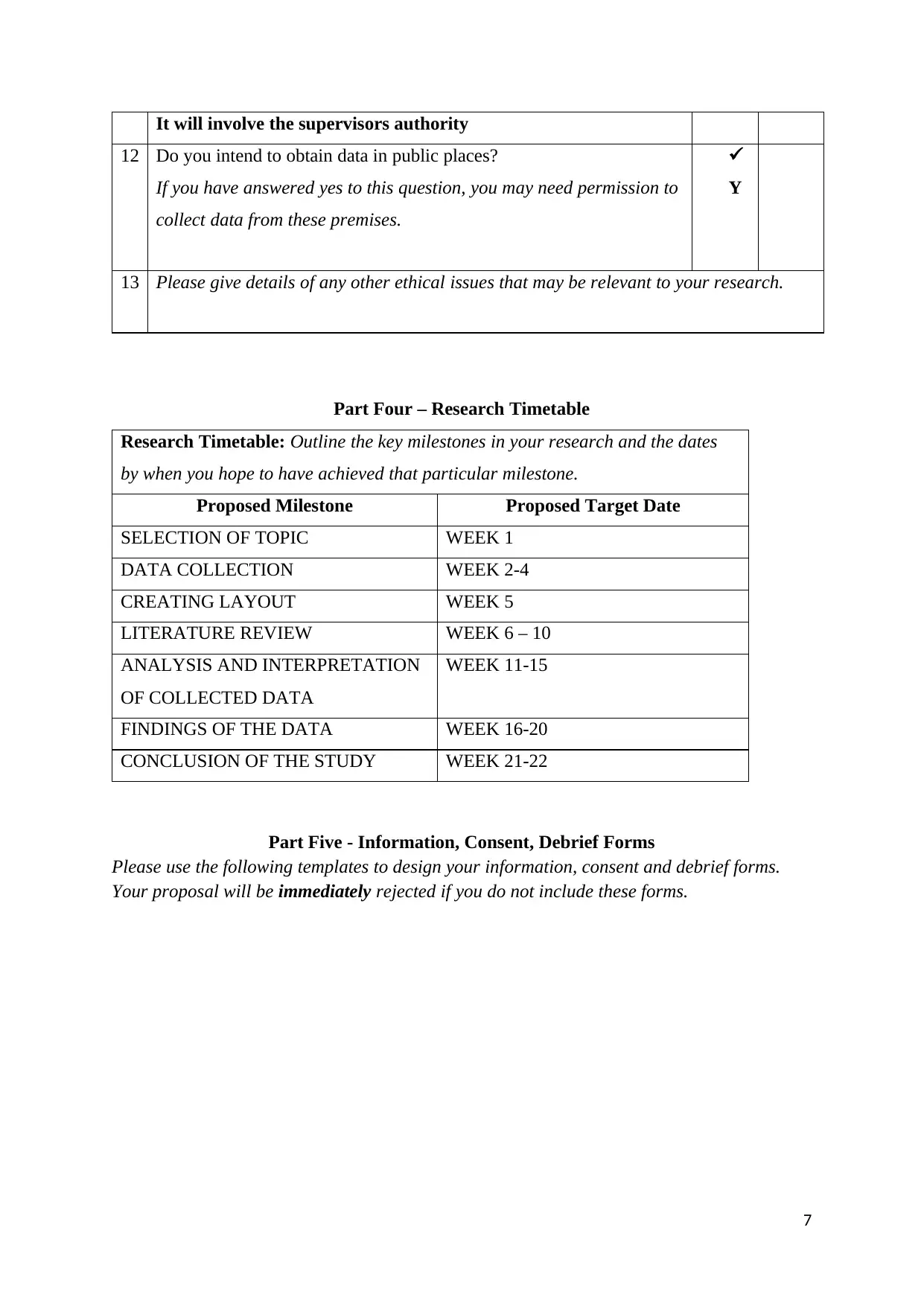
It will involve the supervisors authority
12 Do you intend to obtain data in public places?
If you have answered yes to this question, you may need permission to
collect data from these premises.
Y
13 Please give details of any other ethical issues that may be relevant to your research.
Part Four – Research Timetable
Research Timetable: Outline the key milestones in your research and the dates
by when you hope to have achieved that particular milestone.
Proposed Milestone Proposed Target Date
SELECTION OF TOPIC WEEK 1
DATA COLLECTION WEEK 2-4
CREATING LAYOUT WEEK 5
LITERATURE REVIEW WEEK 6 – 10
ANALYSIS AND INTERPRETATION
OF COLLECTED DATA
WEEK 11-15
FINDINGS OF THE DATA WEEK 16-20
CONCLUSION OF THE STUDY WEEK 21-22
Part Five - Information, Consent, Debrief Forms
Please use the following templates to design your information, consent and debrief forms.
Your proposal will be immediately rejected if you do not include these forms.
7
12 Do you intend to obtain data in public places?
If you have answered yes to this question, you may need permission to
collect data from these premises.
Y
13 Please give details of any other ethical issues that may be relevant to your research.
Part Four – Research Timetable
Research Timetable: Outline the key milestones in your research and the dates
by when you hope to have achieved that particular milestone.
Proposed Milestone Proposed Target Date
SELECTION OF TOPIC WEEK 1
DATA COLLECTION WEEK 2-4
CREATING LAYOUT WEEK 5
LITERATURE REVIEW WEEK 6 – 10
ANALYSIS AND INTERPRETATION
OF COLLECTED DATA
WEEK 11-15
FINDINGS OF THE DATA WEEK 16-20
CONCLUSION OF THE STUDY WEEK 21-22
Part Five - Information, Consent, Debrief Forms
Please use the following templates to design your information, consent and debrief forms.
Your proposal will be immediately rejected if you do not include these forms.
7
Paraphrase This Document
Need a fresh take? Get an instant paraphrase of this document with our AI Paraphraser
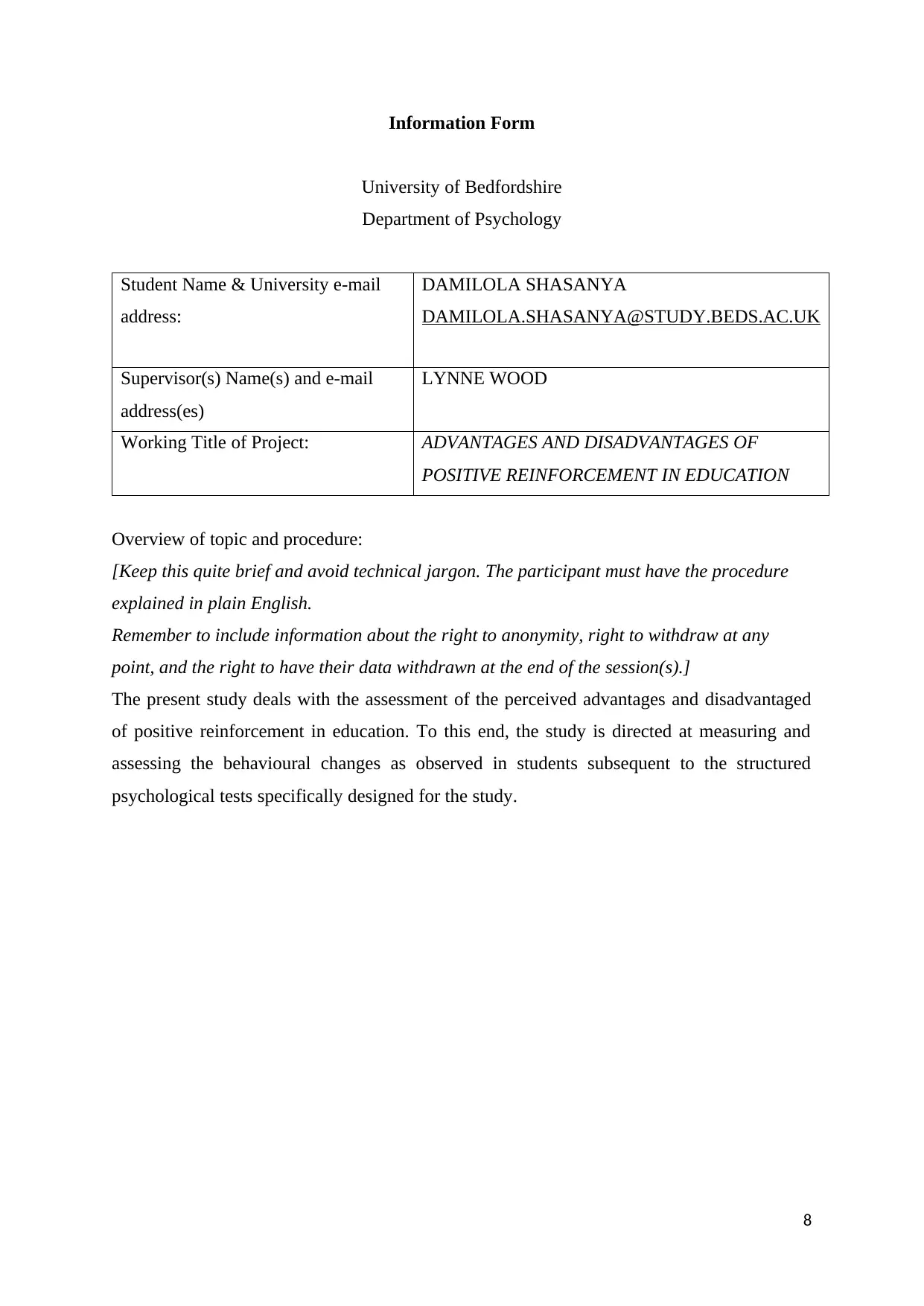
Information Form
University of Bedfordshire
Department of Psychology
Student Name & University e-mail
address:
DAMILOLA SHASANYA
DAMILOLA.SHASANYA@STUDY.BEDS.AC.UK
Supervisor(s) Name(s) and e-mail
address(es)
LYNNE WOOD
Working Title of Project: ADVANTAGES AND DISADVANTAGES OF
POSITIVE REINFORCEMENT IN EDUCATION
Overview of topic and procedure:
[Keep this quite brief and avoid technical jargon. The participant must have the procedure
explained in plain English.
Remember to include information about the right to anonymity, right to withdraw at any
point, and the right to have their data withdrawn at the end of the session(s).]
The present study deals with the assessment of the perceived advantages and disadvantaged
of positive reinforcement in education. To this end, the study is directed at measuring and
assessing the behavioural changes as observed in students subsequent to the structured
psychological tests specifically designed for the study.
8
University of Bedfordshire
Department of Psychology
Student Name & University e-mail
address:
DAMILOLA SHASANYA
DAMILOLA.SHASANYA@STUDY.BEDS.AC.UK
Supervisor(s) Name(s) and e-mail
address(es)
LYNNE WOOD
Working Title of Project: ADVANTAGES AND DISADVANTAGES OF
POSITIVE REINFORCEMENT IN EDUCATION
Overview of topic and procedure:
[Keep this quite brief and avoid technical jargon. The participant must have the procedure
explained in plain English.
Remember to include information about the right to anonymity, right to withdraw at any
point, and the right to have their data withdrawn at the end of the session(s).]
The present study deals with the assessment of the perceived advantages and disadvantaged
of positive reinforcement in education. To this end, the study is directed at measuring and
assessing the behavioural changes as observed in students subsequent to the structured
psychological tests specifically designed for the study.
8
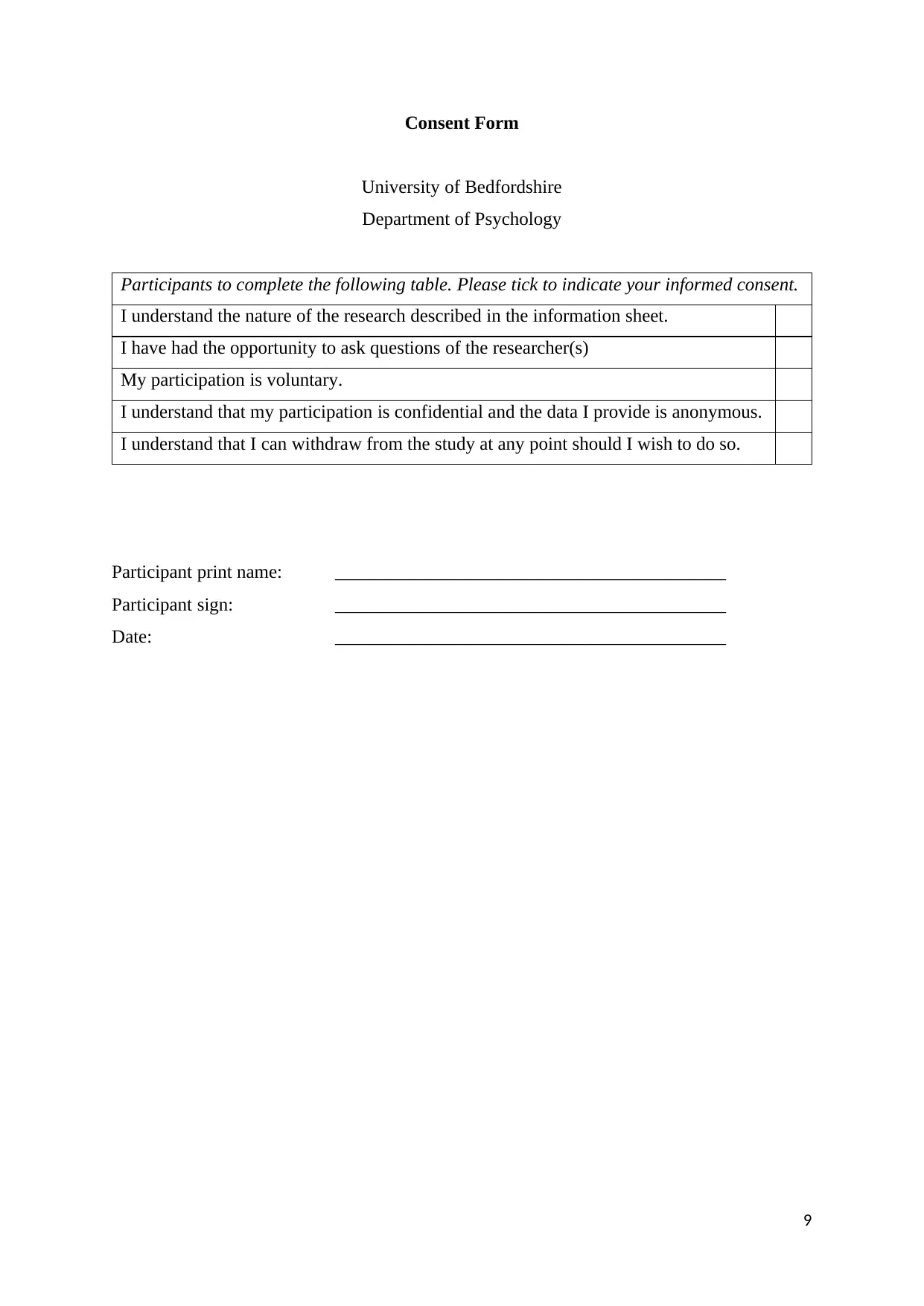
Consent Form
University of Bedfordshire
Department of Psychology
Participants to complete the following table. Please tick to indicate your informed consent.
I understand the nature of the research described in the information sheet.
I have had the opportunity to ask questions of the researcher(s)
My participation is voluntary.
I understand that my participation is confidential and the data I provide is anonymous.
I understand that I can withdraw from the study at any point should I wish to do so.
Participant print name: __________________________________________
Participant sign: __________________________________________
Date: __________________________________________
9
University of Bedfordshire
Department of Psychology
Participants to complete the following table. Please tick to indicate your informed consent.
I understand the nature of the research described in the information sheet.
I have had the opportunity to ask questions of the researcher(s)
My participation is voluntary.
I understand that my participation is confidential and the data I provide is anonymous.
I understand that I can withdraw from the study at any point should I wish to do so.
Participant print name: __________________________________________
Participant sign: __________________________________________
Date: __________________________________________
9
⊘ This is a preview!⊘
Do you want full access?
Subscribe today to unlock all pages.

Trusted by 1+ million students worldwide
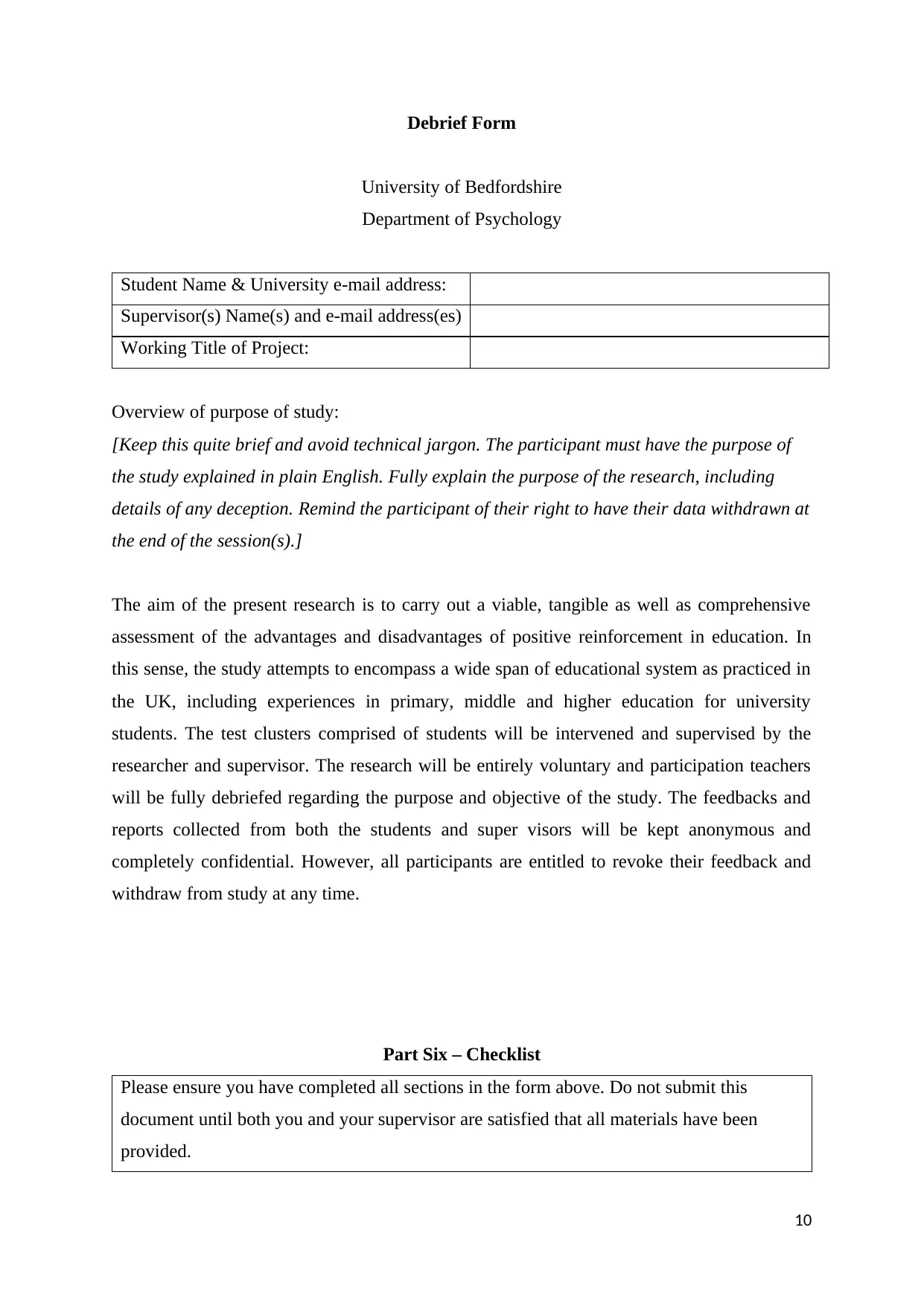
Debrief Form
University of Bedfordshire
Department of Psychology
Student Name & University e-mail address:
Supervisor(s) Name(s) and e-mail address(es)
Working Title of Project:
Overview of purpose of study:
[Keep this quite brief and avoid technical jargon. The participant must have the purpose of
the study explained in plain English. Fully explain the purpose of the research, including
details of any deception. Remind the participant of their right to have their data withdrawn at
the end of the session(s).]
The aim of the present research is to carry out a viable, tangible as well as comprehensive
assessment of the advantages and disadvantages of positive reinforcement in education. In
this sense, the study attempts to encompass a wide span of educational system as practiced in
the UK, including experiences in primary, middle and higher education for university
students. The test clusters comprised of students will be intervened and supervised by the
researcher and supervisor. The research will be entirely voluntary and participation teachers
will be fully debriefed regarding the purpose and objective of the study. The feedbacks and
reports collected from both the students and super visors will be kept anonymous and
completely confidential. However, all participants are entitled to revoke their feedback and
withdraw from study at any time.
Part Six – Checklist
Please ensure you have completed all sections in the form above. Do not submit this
document until both you and your supervisor are satisfied that all materials have been
provided.
10
University of Bedfordshire
Department of Psychology
Student Name & University e-mail address:
Supervisor(s) Name(s) and e-mail address(es)
Working Title of Project:
Overview of purpose of study:
[Keep this quite brief and avoid technical jargon. The participant must have the purpose of
the study explained in plain English. Fully explain the purpose of the research, including
details of any deception. Remind the participant of their right to have their data withdrawn at
the end of the session(s).]
The aim of the present research is to carry out a viable, tangible as well as comprehensive
assessment of the advantages and disadvantages of positive reinforcement in education. In
this sense, the study attempts to encompass a wide span of educational system as practiced in
the UK, including experiences in primary, middle and higher education for university
students. The test clusters comprised of students will be intervened and supervised by the
researcher and supervisor. The research will be entirely voluntary and participation teachers
will be fully debriefed regarding the purpose and objective of the study. The feedbacks and
reports collected from both the students and super visors will be kept anonymous and
completely confidential. However, all participants are entitled to revoke their feedback and
withdraw from study at any time.
Part Six – Checklist
Please ensure you have completed all sections in the form above. Do not submit this
document until both you and your supervisor are satisfied that all materials have been
provided.
10
Paraphrase This Document
Need a fresh take? Get an instant paraphrase of this document with our AI Paraphraser
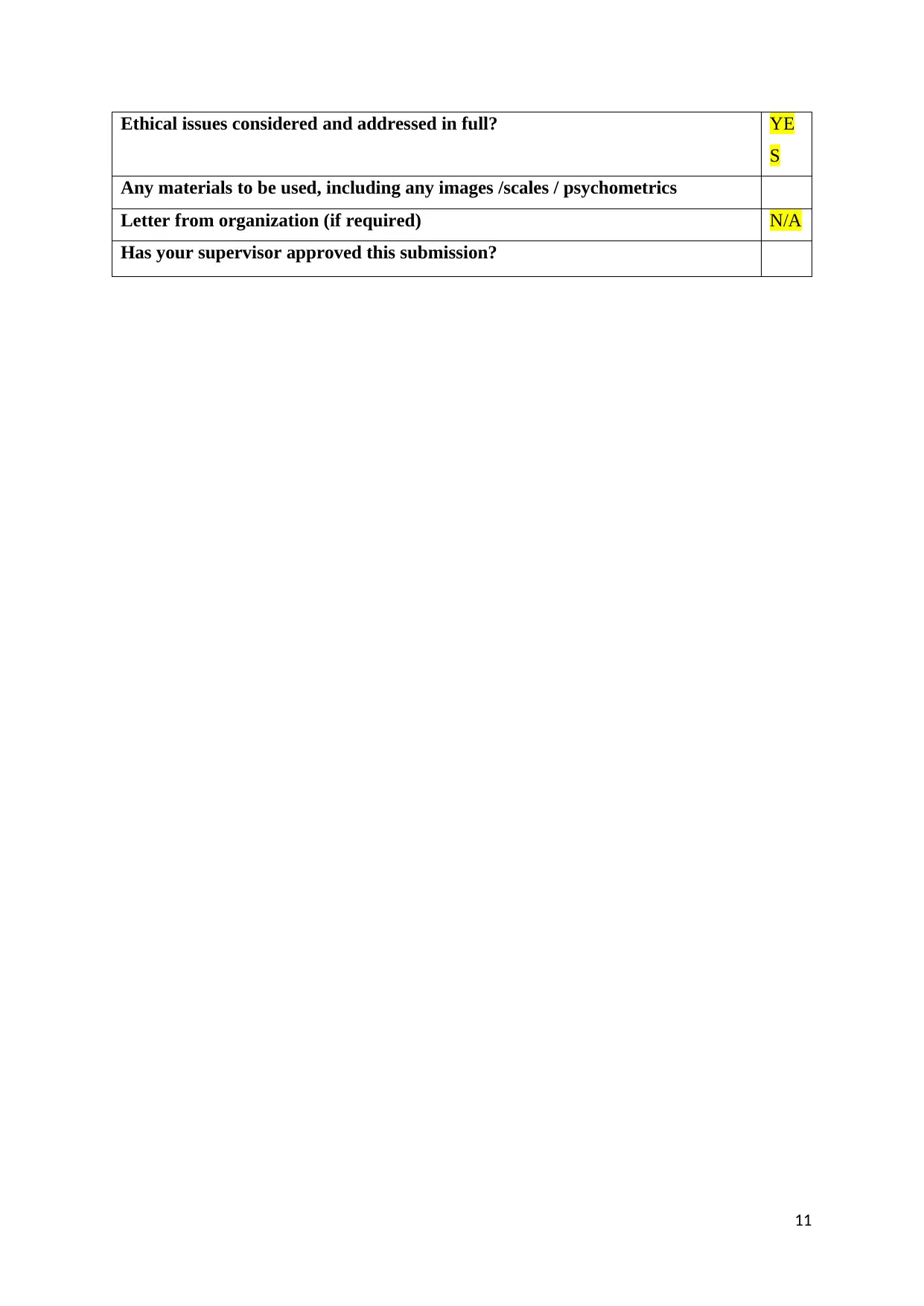
Ethical issues considered and addressed in full? YE
S
Any materials to be used, including any images /scales / psychometrics
Letter from organization (if required) N/A
Has your supervisor approved this submission?
11
S
Any materials to be used, including any images /scales / psychometrics
Letter from organization (if required) N/A
Has your supervisor approved this submission?
11
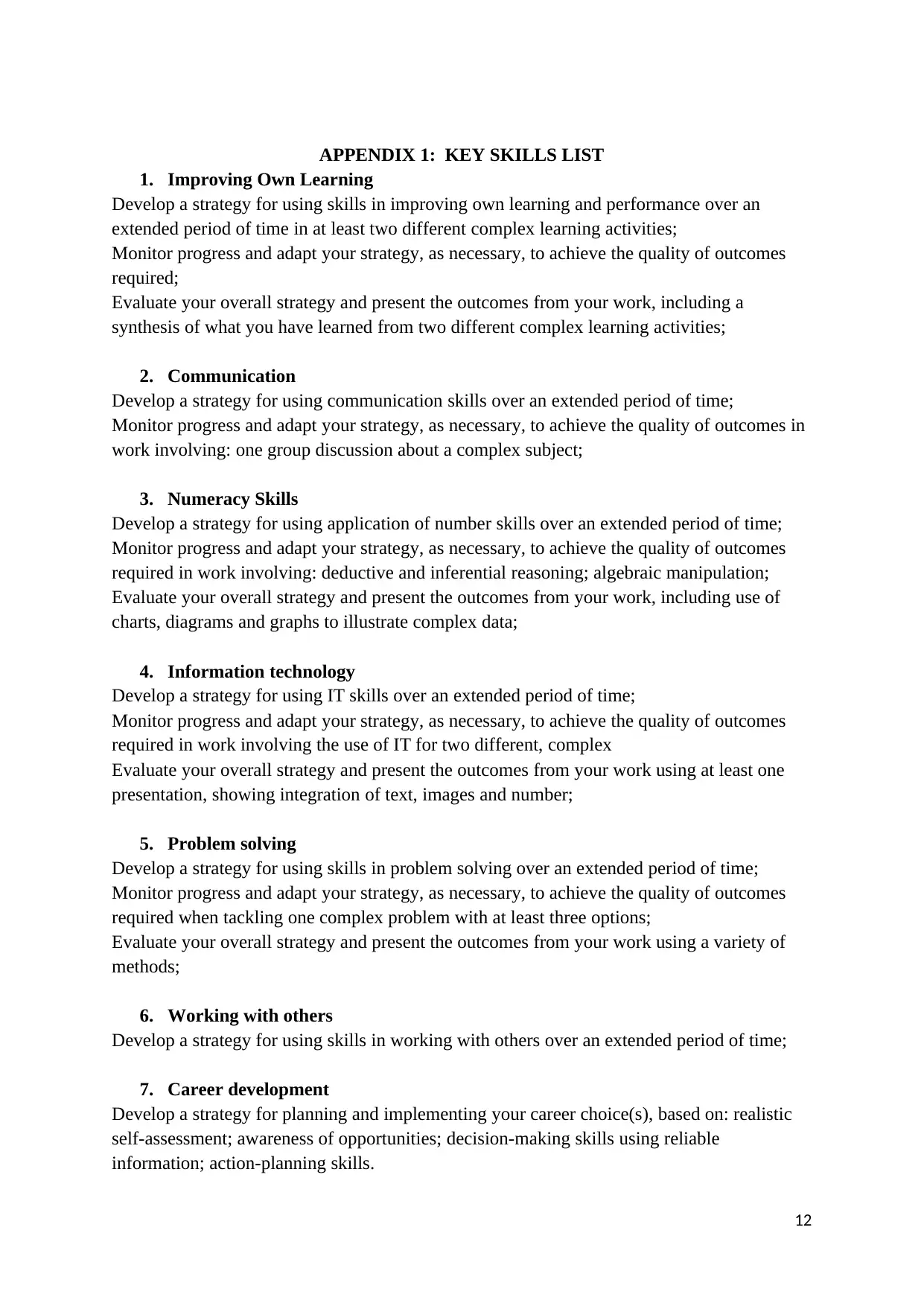
APPENDIX 1: KEY SKILLS LIST
1. Improving Own Learning
Develop a strategy for using skills in improving own learning and performance over an
extended period of time in at least two different complex learning activities;
Monitor progress and adapt your strategy, as necessary, to achieve the quality of outcomes
required;
Evaluate your overall strategy and present the outcomes from your work, including a
synthesis of what you have learned from two different complex learning activities;
2. Communication
Develop a strategy for using communication skills over an extended period of time;
Monitor progress and adapt your strategy, as necessary, to achieve the quality of outcomes in
work involving: one group discussion about a complex subject;
3. Numeracy Skills
Develop a strategy for using application of number skills over an extended period of time;
Monitor progress and adapt your strategy, as necessary, to achieve the quality of outcomes
required in work involving: deductive and inferential reasoning; algebraic manipulation;
Evaluate your overall strategy and present the outcomes from your work, including use of
charts, diagrams and graphs to illustrate complex data;
4. Information technology
Develop a strategy for using IT skills over an extended period of time;
Monitor progress and adapt your strategy, as necessary, to achieve the quality of outcomes
required in work involving the use of IT for two different, complex
Evaluate your overall strategy and present the outcomes from your work using at least one
presentation, showing integration of text, images and number;
5. Problem solving
Develop a strategy for using skills in problem solving over an extended period of time;
Monitor progress and adapt your strategy, as necessary, to achieve the quality of outcomes
required when tackling one complex problem with at least three options;
Evaluate your overall strategy and present the outcomes from your work using a variety of
methods;
6. Working with others
Develop a strategy for using skills in working with others over an extended period of time;
7. Career development
Develop a strategy for planning and implementing your career choice(s), based on: realistic
self-assessment; awareness of opportunities; decision-making skills using reliable
information; action-planning skills.
12
1. Improving Own Learning
Develop a strategy for using skills in improving own learning and performance over an
extended period of time in at least two different complex learning activities;
Monitor progress and adapt your strategy, as necessary, to achieve the quality of outcomes
required;
Evaluate your overall strategy and present the outcomes from your work, including a
synthesis of what you have learned from two different complex learning activities;
2. Communication
Develop a strategy for using communication skills over an extended period of time;
Monitor progress and adapt your strategy, as necessary, to achieve the quality of outcomes in
work involving: one group discussion about a complex subject;
3. Numeracy Skills
Develop a strategy for using application of number skills over an extended period of time;
Monitor progress and adapt your strategy, as necessary, to achieve the quality of outcomes
required in work involving: deductive and inferential reasoning; algebraic manipulation;
Evaluate your overall strategy and present the outcomes from your work, including use of
charts, diagrams and graphs to illustrate complex data;
4. Information technology
Develop a strategy for using IT skills over an extended period of time;
Monitor progress and adapt your strategy, as necessary, to achieve the quality of outcomes
required in work involving the use of IT for two different, complex
Evaluate your overall strategy and present the outcomes from your work using at least one
presentation, showing integration of text, images and number;
5. Problem solving
Develop a strategy for using skills in problem solving over an extended period of time;
Monitor progress and adapt your strategy, as necessary, to achieve the quality of outcomes
required when tackling one complex problem with at least three options;
Evaluate your overall strategy and present the outcomes from your work using a variety of
methods;
6. Working with others
Develop a strategy for using skills in working with others over an extended period of time;
7. Career development
Develop a strategy for planning and implementing your career choice(s), based on: realistic
self-assessment; awareness of opportunities; decision-making skills using reliable
information; action-planning skills.
12
⊘ This is a preview!⊘
Do you want full access?
Subscribe today to unlock all pages.

Trusted by 1+ million students worldwide
1 out of 13
Related Documents
Your All-in-One AI-Powered Toolkit for Academic Success.
+13062052269
info@desklib.com
Available 24*7 on WhatsApp / Email
![[object Object]](/_next/static/media/star-bottom.7253800d.svg)
Unlock your academic potential
Copyright © 2020–2026 A2Z Services. All Rights Reserved. Developed and managed by ZUCOL.





